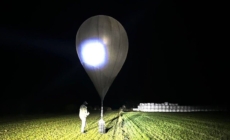-
Kyle Busch Breaks Silence on Crew Chief Change Amid Performance Slump - 21 mins ago
-
George Springer's 20th career playoff home run increases Blue Jays' lead over Yankees - 41 mins ago
-
Amy Schumer, 44, shows off impressive weight loss on social media - 42 mins ago
-
Supreme Court Kicks Off New Term: What to Know - about 1 hour ago
-
Priscilla strengthens into a hurricane in the Pacific. Maps show its path. - about 1 hour ago
-
Daulton Varsho's two-run home run widens Blue Jays' lead over Yankees - about 1 hour ago
-
Saints Make Historical Alvin Kamara Announcement After Beating Giants - 2 hours ago
-
Keith Urban’s guitarist draws attention amid divorce and fan speculation - 2 hours ago
-
“If you’re Schottenheimer, you’re feeling pretty good” — Cowboys roll to dominant win over Jets 😎 - 2 hours ago
-
Cigarette-Smuggling Balloons Force Lithuanian Airport Closure - 2 hours ago
Cigarette-Smuggling Balloons Force Lithuanian Airport Closure
Up to 25 small hot-air balloons carrying smuggled cigarettes entered Lithuanian airspace late Saturday, forcing Vilnius Airport to shut down and delaying flights until operations resumed at 4:50 a.m. Sunday. The balloons interfered with 30 flights, impacting approximately 6,000 passengers, according to Lithuania’s National Crisis Management Center.
Border police recovered 11 balloons and some 18,000 packs of smuggled cigarettes in various locations, according to a spokesman for the airport.
Why It Matters
The incident highlights an unconventional smuggling method that’s disrupting critical infrastructure in a NATO border country. While these balloons were determined to be criminal smuggling operations rather than security threats, the closure comes amid heightened European security concerns following unprecedented airspace intrusions last month.
Lithuania’s proximity to Russian ally Belarus—Vilnius sits just 40 kilometers (nearly 25 miles) from the border—places the Baltic nation on the front line of both smuggling operations and potential security provocations.
What To Know
Two balloons flew directly above Vilnius Airport, with more than two dozen reaching the wider Vilnius County area. The balloons were recorded flying between approximately 8:45 p.m. Saturday and 4:30 a.m. Sunday.
Belarusian smugglers are increasingly using hot-air balloons as a cost-effective alternative to drones for cigarette smuggling into the European Union (EU). Similar incidents occurred in August, though with fewer balloons. Last year, Lithuanian authorities intercepted 966 hot-air balloons entering from Belarus, with 544 recorded so far this year.
The smuggling operations occur against a backdrop of genuine security concerns. On July 10, a Russian-made Gerbera drone flew into Lithuania from Belarus and crashed in Vilnius County. Another crashed at a military training ground on July 28, later found to be carrying an explosive device. Following these incidents, Lithuania’s parliament voted to authorize armed forces to shoot down any unmanned drone violating its airspace.
What People Are Saying
Vilnius Airport Spokesperson Darius Buta told the Associated Press: “Both smuggling balloons and drones are criminal activities, but not as provocations or acts of sabotage.”
What Happens Next?
Operations at the airport have resumed while Lithuanian authorities will continue monitoring the Belarus border for additional balloon incursions.
Reporting from the Associated Press contributed to this article.
Source link































